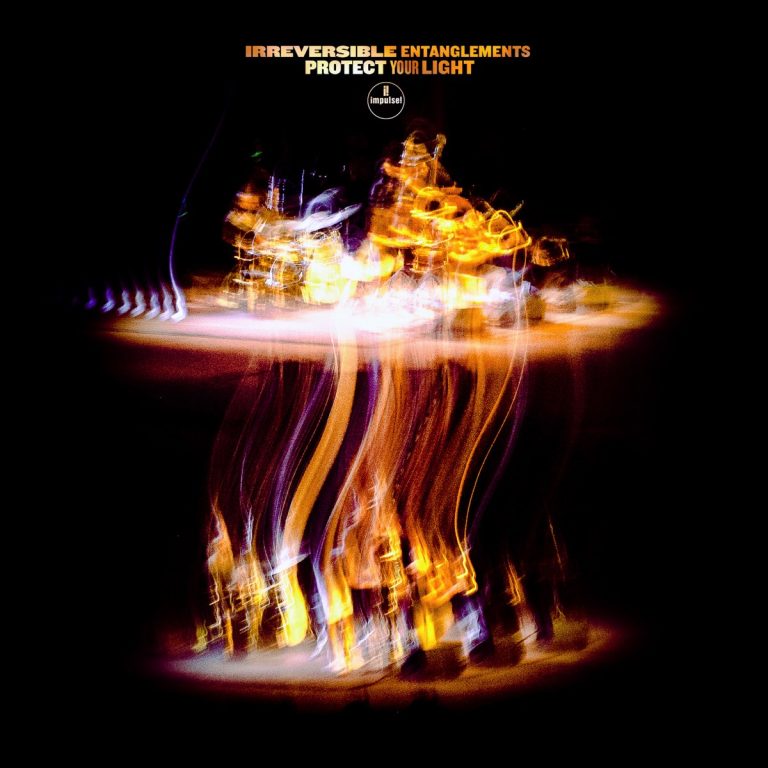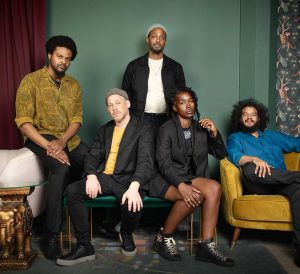“We’ll eat up any stage,” states Camae Ayewa, poet and vocalist with Irreversible Entanglements. “I want to play the Great Wall of China. I want to play on a river in Tokyo. I want to play all the places where we can bring music to the people and stretch out.” That’s a goal the quintet has been pursuing with great verve in recent years. Since forming in 2015, they’ve toured tirelessly, presenting mesmerising improvised live sets, each one a spontaneous journey mixing deeply transcendent grooves with the ecstatic release of free jazz. Typically, the live shows are a single piece of music, often lasting up to an hour, and their past three studio albums – the 2017 self-titled debut, 2020’s “Who Sent You?” and 2021’s “Open The Gates” – have also featured some expansively lengthy tracks.

IRREVERSIBLE ENTANGLEMENTS Protect Your Light
Available to purchase from our US store.But their latest release, “Protect Your Light”, presents a somewhat more concise vision, with eight punchy tracks, none longer than eight minutes. “Yes, we can play for 24 hours straight,” jokes trumpeter Aquiles Navarro. “We can go all day, but I think it’s good in life, every now and then, to challenge yourself, evolve or grow and just try stuff. And it is also part of our tradition – like Chano Pozo, Dizzy [Gillespie] and Duke [Ellington] – that tradition of arranging and assembling our sound. We’ve proved ourselves in the sprawl, many times. To be able to make something [more concise] like that also makes sense.”
The new album features other novel twists – most notably bringing collaborators from outside the band into the studio and folding different instrumental moods into the mix. Cellist Lester St. Louis – previously heard as part of the late trumpeter Jaimie Branch’s Fly Or Die quartet – provides the insistent pizzicato riff at the centre of “Root Branch,” a tribute to the much-missed Branch. Pianist and vocalist Janice A. Lowe contributes a delicate intimacy to the shimmering ballad “Sunshine.” And on the album’s title track, singer Sovei’s soulful exhortations enliven a high-energy batucada rhythm with South American roots.
But, in many ways, “Protect Your Light” is a direct development of deeply felt principles and convictions that have guided the band right from the beginning. Their origin story is, by now, well-known: all five members first met and played together at an event organised by Musicians Against Police Brutality in 2015, in response to the NYPD’s fatal shooting of 28-year-old African American man, Akai Gurley. Ever since, they’ve maintained a radical stance, with Ayewa’s stark poetic pronouncements often offering a bleak, pointed and profoundly anti-establishment commentary on the realities of 21st century urban life and the lingering spectres of colonialism. That urge to speak hard truths can be heard in the new album on the track “Our Land Back,” a sombre meditation on the struggle for self-determination faced by dispossessed peoples.
Yet, the group’s engagement with grave socio-political issues has consistently been allied to and pervaded by a buoyant sense of positivity – as heard on “Open The Gates’” opening title track, beginning with Ayewa’s boisterous proclamation: “Open the gates! / We arrive! / Energy time!” On “Protect Your Light,” that positivity is even more clearly in evidence. The album’s first two tracks set an aspirational agenda from the outset. “Free Love” combines an arresting opening fanfare with an infectious groove over which Ayewa evokes the “free love that lives in you.” The title track, “Protect Your Light,” is an urgent encouragement to nurture our essential spark of individuality and humanity in the face of a hostile environment.
With its blend of the political and the spiritual, there’s a delightful and inevitable logic in the fact that “Protect Your Light” is also the group’s debut release for the storied Impulse! label. In the late 1960s and early 1970s, Impulse! pursued a similar agenda, releasing albums by the likes of Archie Shepp with socially aware messages that foregrounded the Civil Rights and Black Power movements, alongside spiritually yearning classics by John Coltrane, Alice Coltrane and Pharoah Sanders. “It makes sense,” says bassist Luke Stewart. “It’s beautiful that it all came together and we’re very proud to be releasing on this historic label and to be part of that history and chart our own path within that history.” “Yeah, it’s a place to leave statements of magic,” agrees Navarro, “a place where that is invited, because of the label but also because of the people that made it. We really believe in that. It’s a higher force that happens.”
The enormity of joining a roster of artists of the calibre of the Coltranes is something the band doesn’t take lightly. “We love these legends so much,” says drummer Tcheser Holmes. “We’re amongst their presence now, following the legacy and making sure we live up to it.” For saxophonist Keir Neuringer, recording for Impulse! has contributed to a sense of “feeling simultaneously very humbled by our position and very proud of our position. When you go up on the website and you see our band and you see Alice Coltrane and John Coltrane right next to you, that’s totally humbling. And then immediately, simultaneously, is that pride in all of our hard work and being recognised for our collective creativity.”
To add to that sense of continuity with past greats, the album was partly recorded at the famous Van Gelder Studio in Engelwood Cliffs, New Jersey – where so many stone-cold jazz classics were committed to tape – and overseen by the late, legendary recording engineer Rudy Van Gelder’s long-time assistant, Maureen Sickler. “Camae recorded on the same microphone that Ray Charles used,” Stewart marvels. “The innovative musicians that went in there and created history and magic and put out so much spirit… we were able to do the same thing and experience that.” For such devotees of the music, it was impossible not to feel just a little awed by the surroundings. “We were on the same stairs that you see in some of the iconic photos,” remembers Holmes. “I felt like ‘Oh my god, John Coltrane was here working.’ It was a deeper respect. Just to be where he was working to create “A Love Supreme,” that shit was epic.”
“Just like our live performance, our [time in the] studio was a journey for us too,” Ayewa says. “We’re all learning. We all have ideas. When we say the music is improvised, it’s not improvised in a way that we’re not connected to a spirit of dedication, of consistency with the craft and digging deep within ourselves. I really like the word ‘journey,’ because that’s really what it is. It’s a whole story, from the birth, from the seed, from the mother, from the union, all of these things, the universe exploding – it’s all these relationships that we all have to continuously journey through, those of us that are dedicated, to get to the truth of ourselves.” Reflecting on the group’s wide-open creative process in the studio, Navarro states: “We didn’t go in like ‘we’re going to do this, we’re going to talk about that.’ We all come with the best spirit, and if we have an idea, we work on it. And then the music itself, the process, it starts to reveal itself, as long as the intention is right.”
“Right now, the world is upside down and we need a lot more love, a lot more compassion, all these things. That’s where we took our political turn this time. We’re speaking about virtues that are becoming lost.”
Aquiles Navarro
Ultimately, it’s this insistence on right intentions that underpins Irreversible Entanglements’ vision of a politically charged spirituality. “It almost feels like we’re doing manifestation,” Navarro muses. “We’re great wizards in that sense. We had “Open The Gates” and now we’re signed to Impulse! That’s a direct correlation for me for what we’re going for. Right now, the world is upside down and we need a lot more love, a lot more compassion, all these things. That’s where we took our political turn this time. We’re speaking about virtues that are becoming lost.”
Nestled right at the heart of this lies an unabashedly mystical mission not just to alter their own realities, but to transform the world. “I think that’s the implication in the power of improvised music in general,” says Stewart. “As we are an improvising band, we’re always in tune with the possibilities, and in tune with displaying those possibilities. That’s the nature of the music and the nature of what we do with the music as we put the intention of positivity and wonder and discovery, curiosity and risk and love – all those things, all those human emotions – into the music. I think that’s also why we feel so proud that we have this music out there on a platform like Impulse!, because we really feel as if this music can have the power to change lives, in the same way that it has changed our lives.”
Daniel Spicer is a Brighton-based writer, broadcaster and poet with bylines in The Wire, Jazzwise, Songlines and The Quietus. He’s the author of a book on Turkish psychedelic music and an anthology of articles from the Jazzwise archives.
Header image: Irreversible Entanglements. Photo: Piper Ferguson/Impulse! Records.


